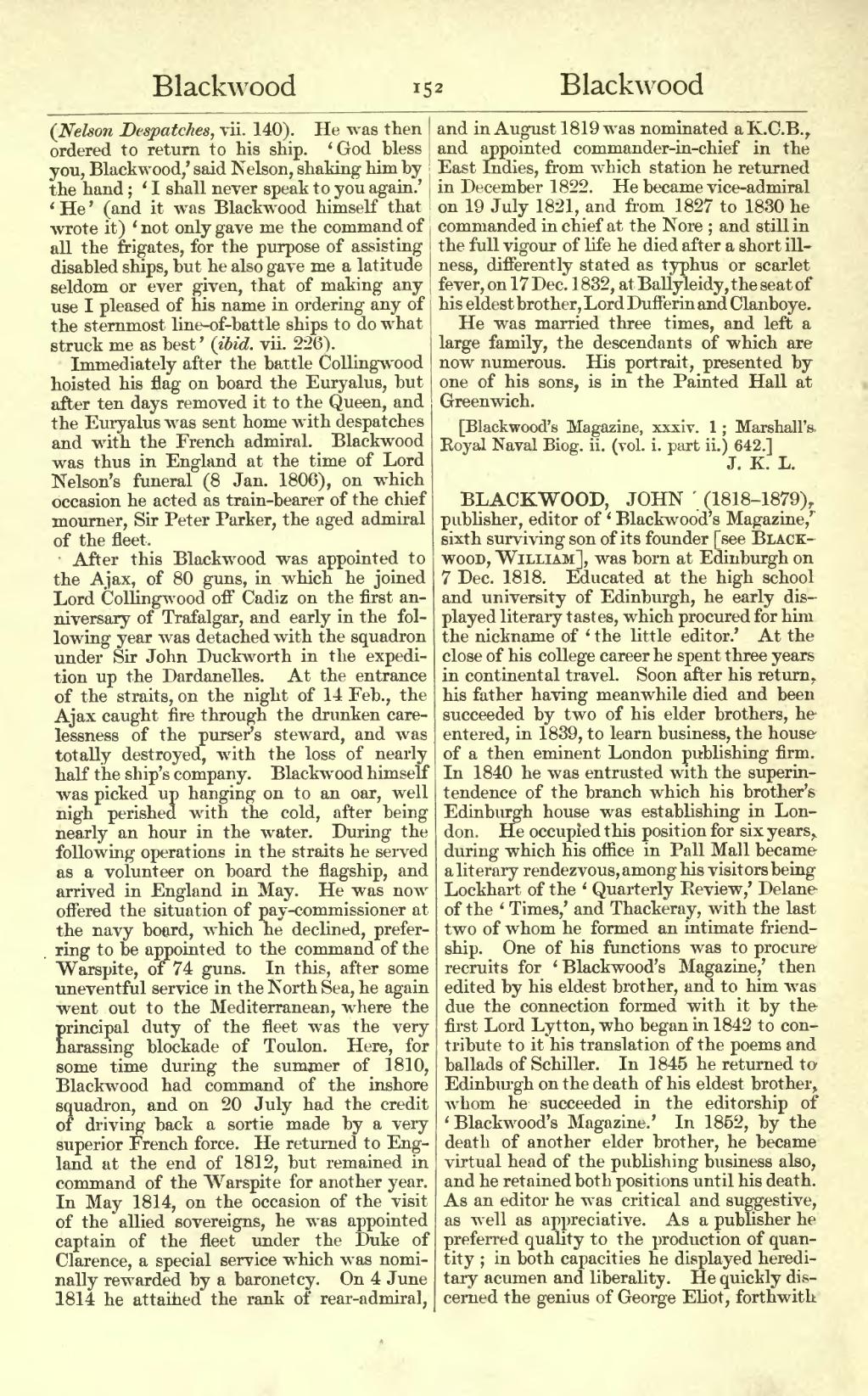(Nelson Despatches, vii. 140). He was then ordered to return to his ship. 'God bless you, Blackwood,' said Nelson, shaking him by the hand; 'I shall never speak to you again.' 'He' (and it was Blackwood himself that wrote it) 'not only gave me the command of all the frigates, for the purpose of assisting disabled ships, but he also gave me a latitude seldom or ever given, that of making any use I pleased of his name in ordering any of the sternmost line-of-battle ships to do what struck me as best' (ibid. vii. 226).
Immediately after the battle Collingwood hoisted his flag on board the Euryalus, but after ten days removed it to the Queen, and the Euryalus was sent home with despatches and with the French admiral. Blackwood was thus in England at the time of Lord Nelson's funeral (8 Jan. 1800), on which occasion he acted as train-bearer of the chief mourner, Sir Peter Parker, the aged admiral of the fleet.
After this Blackwood was appointed to the Ajax, of 80 guns, in which he joined Lord Collingwood off Cadiz on the first anniversary of Trafalgar, and early in the following year was detached with the squadron under Sir John Duckworth in the expedition up the Dardanelles. At the entrance of the straits, on the night of 14 Feb., the Ajax caught fire through the drunken carelessness of the purser's steward, and was totally destroyed, with the loss of nearly half the ship's company. Blackwood himself was picked up hanging on to an oar, well nigh perished with the cold, after being nearly an hour in the water. During the following operations in the straits he served as a volunteer on board the flagship, and arrived in England in May. He was now offered the situation of pay-commissioner at the navy board, which he declined, preferring to be appointed to the command of the Warspite, of 74 guns. In this, after some uneventful service in the North Sea, he again went out to the Mediterranean, where the principal duty of the fleet was the very harassing blockade of Toulon. Here, for some time during the summer of 1810, Blackwood had command of the inshore squadron, and on 20 July had the credit of driving back a sortie made by a very superior French force. He returned to England at the end of 1812, but remained in command of the Warspite for another year. In May 1814, on the occasion of the visit of the allied sovereigns, he was appointed captain of the fleet under the Duke of Clarence, a special service which was nominally rewarded by a baronetcy. On 4 June 1814 he attained the rank of rear-admiral, and in August 1819 was nominated a K.C.B., and appointed commander-in-chief in the East Indies, from which station he returned in December 1822. He became vice-admiral on 19 July 1821, and from 1827 to 1830 he commanded in chief at the Nore; and still in the full vigour of life he died after a short illness, differently stated as typhus or scarlet fever, on 17 Dec. 1832, at Ballyleidy, the seat of his eldest brother, Lord Dufferin and Clanboye.
He was married three times, and left a large family, the descendants of which are now numerous. His portrait, presented by one of his sons, is in the Painted Hall at Greenwich.
[Blackwood's Magazine, xxxiv. 1; Marshall's Royal Naval Biog. ii. (vol. i. part ii.) 642.]
BLACKWOOD, JOHN (1818–1879), publisher, editor of 'Blackwood's Magazine,' sixth surviving son of its founder [see Blackwood, William], was born at Edinburgh on 7 Dec. 1818. Educated at the high school and university of Edinburgh, he early displayed literary tastes, which procured for him the nickname of 'the little editor.' At the close of his college career he spent three years in continental travel. Soon after his return, his father having meanwhile died and been succeeded by two of his elder brothers, he entered, in 1839, to learn business, the house of a then eminent London publishing firm, In 1840 he was entrusted with the superintendence of the branch which his brother's Edinburgh house was establishing in London. He occupied this position for six years, during which his office in Pall Mall became a literary rendezvous, among his visitors being Lockhart of the 'Quarterly Review,' Delane of the 'Times,' and Thackeray, with the last two of whom he formed an intimate friendship. One of his functions was to procure recruits for 'Blackwood's Magazine,' then edited by his eldest brother, and to him was due the connection formed with it by the first Lord Lytton, who began in 1842 to contribute to it his translation of the poems and ballads of Schiller. In 1845 he returned to Edinburgh on the death of his eldest brother, whom he succeeded in the editorship of 'Blackwood's Magazine.' In 1852, by the death of another elder brother, he became virtual head of the publishing business also, and he retained both positions until his death. As an editor he was critical and suggestive, as well as appreciative. As a publisher he preferred quality to the production of quantity; in both capacities he displayed hereditary acumen and liberality. He quickly discerned the genius of George Eliot, forthwith
